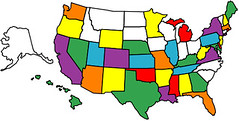 When Kelly Clarkson recently explained that she loves Ron Paul because he believes in states having rights, she had no idea the phrase “states’ rights” would stir so many negative memories. As Fox News explained,
When Kelly Clarkson recently explained that she loves Ron Paul because he believes in states having rights, she had no idea the phrase “states’ rights” would stir so many negative memories. As Fox News explained,
Even before the Civil War, “states’ rights” had become a byword for the protection of black slavery. And since the late Sen. Strom Thurmond ran for president in 1948 as a States’ Rights Democrat, or “Dixiecrat,” the phrase has sometimes been labeled a “dog whistle” for racist elements in the electorate.
Sociologist John Shelton Reed (UNC-Chapel Hill) wasn’t surprised that someone Clarkson’s age didn’t recognize the baggage “states rights’” carried. Similarly, University of Georgia historian James Cobb noted,
“Any time I hear it, I get this sort of little twitch, because I associate it with Ross Barnett or George Wallace,” …referring to the governors of Mississippi and Alabama who, five decades ago, defied efforts to integrate their states’ flagship universities. “But members of the younger generation, it doesn’t have that kind of connotation to them at all. And whether this is to some extent the fault of those of us who are supposed to be educating the younger generations about their past, I can’t say.”
Both Ron Paul and Rick Perry (before he left the race) have used the loaded phrase recently. Other candidates make a point to avoid it.
Whatever reaction it evokes, Cobb, the Georgia historian, said the term has clearly lost much of its sting. “It’s just become part of the lexicon, without any particular meaning,” he says. “It’s been historically decontextualized to the point that it can be thrown around by a lot of people without a second thought.”
Reed, the UNC sociologist, said that’s not necessarily bad. “I do believe states’ rights was a sound doctrine that got hijacked by some unsavory customers for a while — like, 150 years or so…I’m professionally obliged to believe that knowledge is better than ignorance, but some kinds of forgetting are OK with me.”

Comments